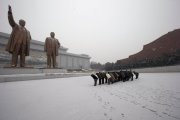
|
 South Korea faces quandary over potential human rights probe of North South Korea faces quandary over potential human rights probe of North
SEOUL — The United Nations’ human rights chief declared recently that the time had come for a “long overdue” investigation into what she called unparalleled rights abuses in North Korea. The probe, unprecedented in scope, could help establish whether the North’s leaders are committing crimes against humanity.
Navi Pillay’s January proposal has already drawn support from the United States. But the decision has proved sensitive in South Korea, where leaders remain divided over whether to confront the North or try to somehow reduce tensions with it, even after Pyongyang last week detonated an underground nuclear device.
South Korea’s support for the human rights investigation is critical, because farther-removed countries view Seoul as the leader on North Korea policy issues.
But the decision on the Commission of Inquiry, or COI, comes at a particularly delicate time for South Korea, where a conservative new president, Park Geun-hye, takes office this month, having vowed to both re-engage with the North and “improve living conditions” for its 24 million citizens. The looming decision on the investigation highlights a fundamental South Korean quandary: Engaging North Korea and pushing it on human rights, though both reasonable goals, are often at odds.
Other countries “should understand the sensitivities faced by South Korea” when speaking out about human rights, said Song Min-soon, who was South Korea’s foreign minister from 2006 until 2008 under liberal president Roh Moo-hyun. “Those countries, they don’t have a real need to sit down with North Korea. We do. The new South Korean government has a plan to talk with the North Koreans about denuclearization, economic issues. But if we lead efforts on the COI, that won’t happen.”
Park has blasted the North for conducting the much-anticipated nuclear test. But her incoming administration, according to analysts, is uneasy about scrapping any hope of civil ties with the North even before Park takes office. The nuclear test has only made South Korea’s decision on the U.N. investigation “more sensitive,” said one South Korean government official.
In the two decades of serious advocacy for human rights in North Korea — begun when defectors first started fleeing the country and telling their stories — little has changed inside the repressive police state, according to activist and government reports. It remains a crime in the North to criticize the government, watch a South Korean television show or leave dust on founder Kim Il Sung’s portrait. Those found guilty of crimes that Pyongyang considers grave are sent, often along with their parents and children, to prison camps in isolated mountain areas where they almost always stay for life.
Somewhere between 150,000 and 200,000 people, according to multiple human rights reports, are locked up in these camps, the deepest secrets of a secretive country.
The North says it is impossible for such rights violations to happen under its socialist system and views any discussion of its human rights as a “grave provocation” — something Park is likely to hear from Pyongyang if she backs the investigation, which could be voted on at the next U.N. Human Rights Council meeting in March.
(2013-02-21/washingtonpost)
|





